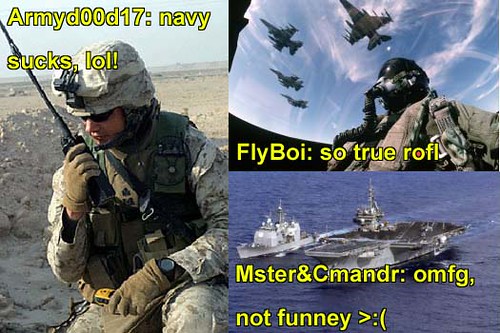
Despite my earlier jab, Barry Rosenberg's cover article from this month's Armed Forces Journal is really fantastic. His thesis? The U.S. military must be prepared to make some enormous cultural changes if it really wants to embrace network-centric warfare:
Until recently, collection assets would feed information up the line to divisional commanders and they would pass it up or parcel it down on a need-to-know basis. However, today, many war fighters have access to the same data as their commanders and are being given the opportunity to not only critique that information but also to act upon it independently of commanders' orders.
As a result of everyone having access to the Global Information Grid (GIG), leaders are faced with the challenges of commanding young men and women who have been plugged in to communications and entertainment devices since they were kids, while at the same time respecting the traditional pyramid model of command. In many instances, the growing pains are obvious.
"There's no way to run a military without a hierarchical structure," said retired Lt. Gen. William Odom, a senior fellow at the Hudson Institute and former director of the National Security Agency under President Reagan. "When you hook everyone up to the Internet and give them processing capability, you are essentially flattening the chain of command. If everybody is making independent decisions, the likelihood they will be coordinated to a mission goes down."
Odom said that what we're experiencing today are "constipated information channels" and "diarrhea of the e-mail." Both have increased the capability and propensity of senior leaders to micromanage from afar. The question now is whether the military can develop senior commanders who will allow lower commanders to make decisions — and then stay out of their hair and live with the results.
In the broadest sense, LTG Odom is right -- the military requires a certain amount of hierarchy that is irreducible. If the general knew his history though, he would know that the idea of 'hierarchy' is sometimes flexible.
I imagine a guy like Field Marshal Donald Haig back in 1915 would have rejected the idea of using fire teams to infiltrate enemy trenches. He would have argued that giving foot soldiers enough autonomy to maneuver on their own would reduce the 'likelihood they will be coordinated to a mission' as well. Two years later, Germany's stormtroopers mostly proved him wrong.
[On an interesting historical note, stormtroopers weren't actually a German idea, but were instead based on the writings of a French Army captain named Andre Laffargue. He proposed this strategy of small units and infiltration to the French General Staff in 1915 and they dismissed it out of hand. In response, Laffargue self-published the operational concept as a pamphlet, which the Germans captured and translated in 1916.]
So how should the military resolve this issue of autonomy? Rosenberg gives commanders a simple four-point plan: 1) Clearly articulate the objective, 2) provide your troops with operational boundaries, 3) set their rules of engagement, and 4) take a very hands-off approach. Frankly, I couldn't agree more. U.S. troops are smarter and better trained today than at any point in the military's history. Sure, they will probably need more classes in anthropology and foreign languages, but changing that is easy enough.
Rosenberg also converges with Marine General Charles Krulak's idea about the strategic corporal. Krulak argues that future battlefields and future missions will be so complex and fluid that troops on the ground will rarely have time to reach up the chain of command for orders. In response, the military should be prepared to devolve leadership to the lowest level, the squad leader, who is typically only a corporal.
Krulak's position seems reasonable enough, but there is a tension between his "strategic corporal" thesis and what is referred to as the "7000-mile screwdriver" -- a term coined to describe Donald Rumsfeld's micromanagement of the Iraq War. Improvements in headquarters-level situational awareness have encouraged commanders to micromanage their troops at a time when they need a greater amount of autonomy.
If current problems any indicator, giving troops more autonomy will probably be far more difficult than suiting them up for network-centric warfare. On the one hand, you have politicians who would rather blow millions on a pie-in-the-sky global strike program than take risks or ask for sacrifice. On the other, you have an inbred generation of military leaders who prefer to go into battle unprepared over providing civilian leaders with objective (but sometimes unpalatable) advice.
Matching doctrine to technology is definitely possible, let's just say I'm not confident about the prospects.

No comments:
Post a Comment